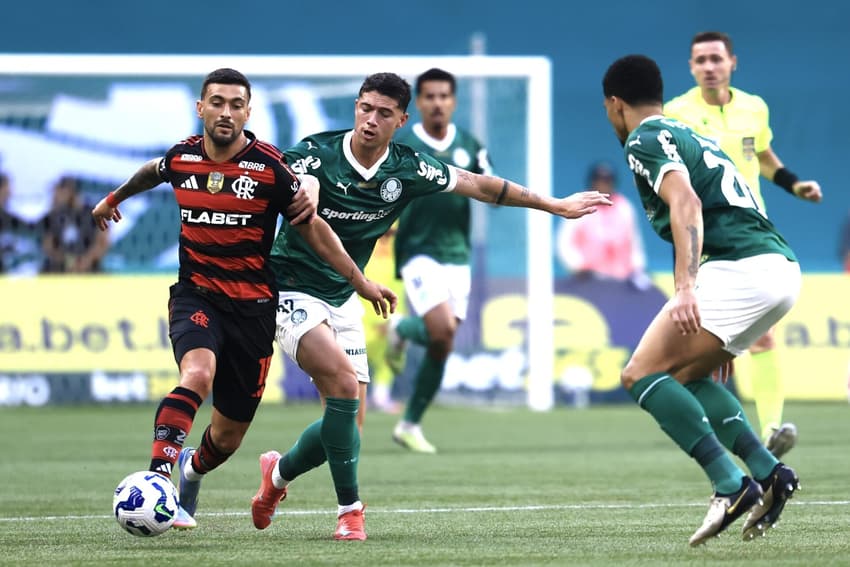In the vibrant, often tumultuous world of Brazilian football, the drama isn`t always confined to the ninety minutes on the pitch. Sometimes, the most intriguing contests unfold behind the scenes, away from the roaring crowds and television cameras. Such was the case recently when two of Brazil`s footballing titans, Flamengo and Palmeiras, found their pre-match preparations interrupted by an unscheduled visit from the Brazilian Anti-Doping Authority (ABCD).
Just days before their pivotal clash in the 29th round of the Campeonato Brasileiro, athletes from both clubs underwent surprise anti-doping tests at their respective training centers. While Palmeiras seemingly took the procedure in stride, categorizing it as the fifth such instance in 2025—three by ABCD and two by CONMEBOL—Flamengo`s reaction was notably less sanguine. The Rio de Janeiro giants voiced their discontent, characterizing the action as “surprising” and expressing concern that ABCD representatives had observed their tactical movements during a crucial training session.
The Rubro-Negro`s Unease: A Tactical Dilemma?
For Flamengo, the issue wasn`t the test itself, but its timing and the perceived intrusion into their strategic privacy. “Of the nine ABCD representatives present,” their statement highlighted, “three fully observed the team`s tactical movements before a decisive weekend commitment.” In a sport where tactical advantage can dictate championship outcomes, having external eyes on confidential game plans, however unintentional, might have felt akin to a rival scouting mission—albeit one sanctioned by a higher authority.
It`s an understandable sentiment. A coach spends countless hours perfecting formations, set-piece routines, and strategic adjustments. To have these secrets potentially exposed, even to individuals whose primary concern is player welfare, introduces an uncomfortable dynamic. For a club like Flamengo, perennially at the top and under immense scrutiny, every detail matters.
ABCD`s Stance: Integrity Above All
The ABCD, however, stood firm in its defense, emphasizing that anti-doping controls are a fundamental and habitual part of an athlete`s career. Their response to the media was unequivocal: “If these teams are equally relevant, they will be treated equally.” This statement underscores a core principle of anti-doping efforts: impartiality and unpredictability.
The Authority clarified that all actions conform strictly to the World Anti-Doping Code, the Brazilian Anti-Doping Code, and WADA`s International Standard for Testing and Investigations. The key takeaway from their detailed explanation is the necessity of unannounced tests, performed “at any time, in any place,” without prior warning. This element of surprise is not arbitrary; it is the bedrock of an effective anti-doping system, designed to deter illicit substance use by making it impossible to predict when and where a test might occur.
The ABCD also addressed the presence of its officials during training, explaining it`s a standard procedure to accompany athletes from notification until sample collection is complete. This process, they stressed, is mandatory and does not aim to interfere with ongoing activities but ensures the integrity and confidentiality of the entire testing procedure. Officials, they noted, observe operational limits and respect privacy, awaiting the conclusion of training sessions before finalizing collections.
The Broader Picture: Fair Play and Fan Trust
While Flamengo`s frustration is relatable, the ABCD`s actions highlight a crucial, often inconvenient truth: the fight for sports integrity demands constant vigilance. In a high-stakes environment where the temptation to gain an unfair advantage can be immense, robust anti-doping protocols are not merely bureaucratic hurdles but essential safeguards.
The occasional friction between teams and anti-doping agencies is a byproduct of this critical mission. For every moment of inconvenience experienced by a club, there`s a broader benefit: a level playing field, credible results, and, most importantly, the enduring trust of the fans. Without these checks, the very foundation of competitive sport—the belief in fair competition—would crumble.
Ultimately, while Flamengo might ponder the tactical implications of their recent “uninvited guests,” and Palmeiras might simply shrug and move on, both teams, and indeed the entire footballing world, benefit from the unwavering commitment of bodies like the ABCD. These guardians of integrity ensure that when the whistle blows, what we see is a genuine display of talent, hard work, and fair play—a spectacle truly worth watching.









